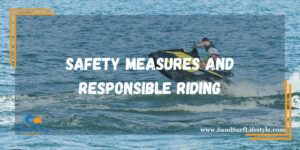When it comes to aquatic adventures, few things compare to the thrill of riding a jet ski. These compact watercraft offer an exhilarating experience, allowing you to skim across the water’s surface with the wind in your hair and the sun on your face. However, as with many recreational activities, there are rules and regulations in place to ensure safety on the water. One common question that arises among jet ski enthusiasts is whether you need a boating license to operate a jet ski.
You need a boating license for a jet ski in some areas, but not everywhere. Licensing requirements vary by location, so it’s crucial to check your local regulations. Regardless, prioritizing safety and responsible riding is essential for a thrilling yet safe jet ski experience.
1. The Basics of Jet Ski Operation

Jet skis, often referred to as personal watercraft (PWC), offer a unique and exhilarating way to explore the open water. These compact vessels are distinct from traditional boats in several ways, making them a thrilling choice for aquatic enthusiasts.
First and foremost, jet skis are designed for agility and speed. They are typically small and lightweight, accommodating one to three riders at most. This compact size not only makes them easy to transport but also allows for nimble handling on the water.
The key innovation that sets jet skis apart is their propulsion system. Unlike conventional boats, which rely on propellers, jet skis use a jet of water expelled from the rear of the craft to generate forward motion. This design feature enables rapid acceleration and quick maneuverability, making jet skis a favorite for those seeking an adrenaline rush.
Understanding these fundamental characteristics of jet skis is crucial, not only for operating them safely but also for appreciating the unique experience they offer on the water. Whether you’re a beginner or a seasoned rider, mastering the art of handling a jet ski is essential for a safe and enjoyable ride.
To learn about Jet Ski weight limits and considerations, check out this article.
2. Age and Operator Restrictions
Age restrictions play a crucial role in jet ski operation regulations across various regions. These restrictions aim to strike a balance between providing young riders with the opportunity to enjoy this thrilling water sport and ensuring their safety on these powerful machines. While the exact age requirements may differ depending on your specific location and the governing authorities, there are commonalities that reflect a commitment to safety.
Typically, age restrictions for jet ski operators hover around 16 to 18 years old. These age limits are set with the understanding that individuals in this age range are more likely to possess the necessary physical coordination, judgment, and maturity required to handle the demands of a jet ski safely.
These age restrictions are not arbitrary but rather a proactive approach to minimize the risk associated with operating a high-speed watercraft. They are designed to protect both young riders and others who share the waterways, ensuring that jet skiing remains an exhilarating yet safe water activity for everyone.
3. Licensing Requirements
Now, let’s address the central question: Do you need a boating license to operate a jet ski? The answer to this question varies from place to place. In some areas, a boating license is indeed required, while in others, it is not. Here are a few factors that influence whether you need a boating license for a jet ski:
State and Local Regulations
Licensing requirements for jet ski operations are dictated by state and local authorities, and they can vary significantly. For instance, in states like Florida and California, operators of personal watercraft are required to complete a boating safety course and obtain a boating safety education ID card. These courses cover essential topics such as navigation rules, safety procedures, and environmental awareness, ensuring that jet ski operators have a comprehensive understanding of responsible watercraft operations.
Age-Based Licensing
Age-based licensing requirements are common in various regions. Even if a boating license isn’t mandatory, younger riders may face age-related restrictions. These restrictions are in place to align the age of the operator with their readiness and capabilities, promoting safer jet ski experiences for both the riders themselves and others on the water.
Boating Laws and Regulations
Staying informed about boating laws and regulations specific to your area is vital for any jet ski enthusiast. These laws encompass a wide range of aspects, including speed limits, no-wake zones, equipment requirements, and safety protocols. They can change over time, so continuous awareness is crucial to ensure that you comply with the most up-to-date regulations and contribute to a safer and more enjoyable waterway experience for everyone.
4. Boating Safety Education Courses
Even if your location doesn’t mandate a boating license for jet ski operations, enrolling in a boating safety education course is a smart choice. These courses offer a wealth of knowledge on various aspects of watercraft operation, including navigation, safety protocols, and understanding the rules of the water. They equip you with essential skills and insights that contribute to responsible jet ski operations. By taking such a course, you not only enhance your safety but also promote a safer water environment for all.
5. Insurance Considerations
While not always legally required, having insurance for your jet ski is a prudent decision. Jet skis can incur substantial repair or replacement costs in the event of accidents, damage, or liability claims. Jet ski insurance provides a financial safety net, covering these unforeseen expenses and mitigating the financial burden. It offers peace of mind, ensuring that you can enjoy your jet ski adventures without worrying about potential financial setbacks that could arise from accidents or mishaps on the water.
6. Safety Measures and Responsible Riding

Whether or not you need a boating license, safety should always be a top priority when operating a jet ski. Here are some essential safety measures and responsible riding practices to keep in mind:
Wear a Life Jacket
The importance of wearing a life jacket while on a jet ski cannot be overstated. Life jackets or personal flotation devices (PFDs) are your first line of defense in case of an unexpected fall into the water. They provide buoyancy and help keep you afloat, reducing the risk of drowning. A properly fitting life jacket ensures that you stay afloat comfortably, allowing you to focus on getting back onto your jet ski or awaiting assistance. In emergencies, these life-saving garments are invaluable and can make the difference between a minor incident and a tragic accident.
Follow Speed Limits
Adhering to posted speed limits and respecting no-wake zones is fundamental to safe jet skiing. Excessive speed on a jet ski increases the likelihood of accidents and collisions with other watercraft, swimmers, or stationary objects. Speed limits are in place to protect both jet ski operators and others enjoying the water. Maintaining a controlled speed not only enhances safety but also allows you to better react to unforeseen hazards or changes in the water environment.
Maintain a Safe Distance
Keeping a safe distance from other watercraft, swimmers, and objects in the water is an essential safety practice for jet ski operators. While jet skis are known for their agility and quick maneuverability, it’s vital to provide ample space to react to potential dangers. Maintaining distance minimizes the risk of collisions and accidents, ensuring that everyone can enjoy the water safely.
Respect the Environment
Being environmentally conscious while jet skiing is crucial. Avoid disturbing wildlife, such as nesting birds or marine mammals, and refrain from venturing into protected or restricted areas. By respecting the environment, you help preserve natural habitats and maintain the delicate balance of aquatic ecosystems for future generations to enjoy.
Alcohol and Drugs
Operating a jet ski under the influence of alcohol or drugs is not only illegal but also extremely dangerous. Intoxication impairs judgment, coordination, and reaction times, significantly increasing the risk of accidents. Jet skiing requires alertness and quick decision-making, making it incompatible with any form of impairment. Aside from the immediate safety concerns, boating under the influence can result in legal consequences and penalties, including fines and license suspension.
Emergency Equipment
Familiarizing yourself with the emergency equipment on your jet ski is paramount for your safety and the safety of others on the water. Essential emergency equipment includes the engine cutoff switch, which can stop the jet ski in case of an emergency. Knowing how to use this equipment ensures that you can swiftly respond to critical situations, such as preventing runaway jet skis or rendering assistance to someone in distress. Being prepared and knowledgeable about your jet ski’s emergency features is a responsible and proactive step toward a safer watercraft operation.
Enforcement and Penalties
Operating a jet ski without the necessary boating license or disregarding safety regulations can lead to legal consequences. Waterway enforcement authorities, such as the Coast Guard or local law enforcement agencies, are responsible for ensuring compliance with boating regulations. If you’re caught violating these rules, you may face penalties and fines.
These penalties can vary depending on the severity of the violation and local regulations. Common infractions include operating without a license, exceeding speed limits, or boating under the influence. Penalties can range from warnings and fines to suspension of boating privileges and, in extreme cases, criminal charges.
By enforcing these penalties, authorities aim to promote safe and responsible watercraft operation, protecting both jet ski operators and other waterway users. It’s essential to familiarize yourself with the specific regulations in your area to avoid legal consequences and prioritize safety on the water.
8. International Regulations
Jet ski enthusiasts planning to operate their watercraft in international waters or foreign countries must be aware of the significant variations in licensing requirements and regulations from one location to another. Each country has its own set of rules and standards governing jet ski operations.
Before embarking on international jet ski adventures, thorough research is essential. You must understand and comply with the regulations of the specific destination you intend to visit. This includes not only licensing requirements but also local laws related to speed limits, navigation, and safety equipment.
Failing to adhere to international regulations can result in legal complications, fines, and even the confiscation of your jet ski. Therefore, careful preparation and a commitment to compliance are vital when jet skiing in foreign waters. Respecting the rules of the host country ensures a smooth and enjoyable experience while also contributing to safe and responsible global waterway use.
To learn about Jet Ski licensing, check out this article.
Conclusion
The need for a boating license to operate a jet ski depends on your location and local regulations. While some regions mandate boating education and licensing, others do not. Regardless of licensing requirements, prioritizing safety, responsible riding practices and environmental stewardship should be at the forefront of every jet ski operator’s mind. Consider taking a boating safety education course even if it’s not mandatory in your area, and always stay informed about the latest boating laws and regulations to ensure a safe and enjoyable jet skiing experience.
Frequently Asked Questions
1. How can I find out about the boating regulations in my area?
To learn about the boating regulations in your area, contact your local boating authority, visit their website, or inquire at a nearby marina or boating facility.
2. Is it safe for beginners to operate a jet ski?
Jet skiing can be safe for beginners if they receive proper training, follow safety guidelines, and start in calm waters. Beginners should consider taking a boating safety course.
3. Can I rent a jet ski if I don’t have a boating license?
Rental companies often provide jet skis to individuals without boating licenses, but they may require a safety orientation or training session before rental. Always check with the rental provider for their specific requirements.
Please note that the contents of this blog are for informational and entertainment purposes only and should not be construed as legal advice. Any action taken based on the information provided in this blog is solely at your own risk. Additionally, all images used in this blog are generated under the CC0 license of Creative Commons, which means they are free to use for any purpose without attribution.

